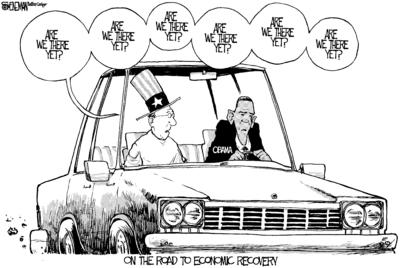- MENU
- HOME
- SEARCH
- VIDEOS
- WORLD
- MAIN
- AFRICA
- ASIA
- BALKANS
- EUROPE
- LATIN AMERICA
- MIDDLE EAST
- United Kingdom
- United States
- Argentina
- Australia
- Austria
- Benelux
- Brazil
- Canada
- China
- France
- Germany
- Greece
- Hungary
- India
- Indonesia
- Ireland
- Israel
- Italy
- Japan
- Korea
- Mexico
- New Zealand
- Pakistan
- Philippines
- Poland
- Russia
- South Africa
- Spain
- Taiwan
- Turkey
- USA
- BUSINESS
- WEALTH
- STOCKS
- TECH
- HEALTH
- LIFESTYLE
- ENTERTAINMENT
- SPORTS
- RSS
- iHaveNet.com: Economy
by Paul A. Samuelson

What Does It Mean and What Does It Not Mean?
The recession is likely over now (or very soon). So says the Federal Reserve Chairman. At most central banks around the globe the same story is now being proclaimed.
Just what does this mean? And what does it not necessarily mean?
Using standard dictionary terms, once the perilous drops in production and job opportunity do level off, that's when the macro forecasters will declare that the recession is over.
But this does not mean that a powerful V-shaped recovery in total production and consumer spending will necessarily soon follow.
In fact, most forecasters in government and private agencies warn that there might follow only a rather weak "recovery," which will be slow and where the unemployment rate will continue to rise in the short term.
Indeed, when Japan experienced a lost decade after its real estate and stock bubbles collapsed in 1990, there followed recurrent new recessions!
Republican ideologues do not understand these things. President Franklin Roosevelt ended the 1929-1933 recession that prevailed during his predecessor Herbert Hoover's first years in the
The Obama economic team has been a good one. Had Republican John McCain won the 2008 presidential election, Main Street USA by now would have been some 20 percent below where it is today.
What has made the Obama-Bernanke difference? Only by pouring multiple billions of dollars into rescuing banks and other loan agencies was an utter meltdown averted.
Statements in Congress and discussions on talk shows will now be testing not the relative merits of employing handouts of billions of dollars of rescue money. College sophomores know that the senatorial opponents of the rescue plan are ignorant of past economic history.
Rather what will be tested is simply whether the democracy of Presidents Washington and Lincoln will be thwarted by the vast dollars that lobbyists nowadays bring to bear against centrist compromises.
Unregulated capitalism has led everywhere to its own self-imposed defeats.
Since Ronald Reagan's tenure in the
The three major agencies purporting to warn against rash riskiness have given AAA rankings to hundreds of bad mortgage loans, good such loans, and anything in between. Any intelligent auditor who provided honest advice would lose the patronage of the corporation that hired him.
No wonder then the rich have been getting richer these last 40 years, while plain folk are getting a diminishing fraction of the total common economic pie.
The middle way -- regulated private markets plus government stabilizers -- wins out all over the world when given a chance.
I try to be a realist, avoiding both excessive optimism or pessimism.
That's why I award two cheers for Centralism. Karl Marx and Milton Friedman are wrong, each in his different way, and neither can deliver the long-run blessings of stable and growing standards of living.
© Tribune Media Services
WORLD | AFRICA | ASIA | EUROPE | LATIN AMERICA | MIDDLE EAST | UNITED STATES | ECONOMY | EDUCATION | ENVIRONMENT | FOREIGN POLICY | POLITICS
Economy: End of The Recession Around the Corner? - Paul A. Samuelson